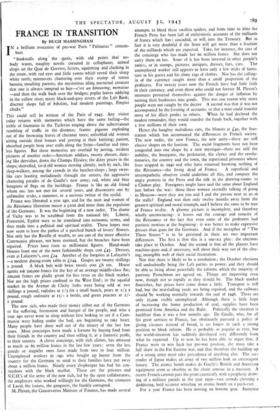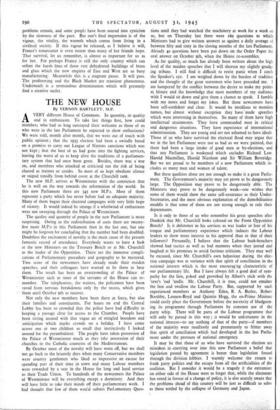FRANCE IN TRANSITION
By HUGH MASSINGHAM
IN a brilliant evocation of pre-war Paris " Palinurus "' remem- bers " bookstalls along' the quais, with old prints that no- body wants, naughty novels corseted in cellophane; animal shops on the Quai de Gesvres; ferrets, squirming and clucking in the straw, with red eyes and little yawns which reveal their sharp white teeth; marmosets chattering over their stump of rotten banana, moulting parrots; the mysterious ailing nocturnal creature that one is always tempted to buy—c'est un binturong, monsieur —and then the walk back over the bridges; poplar leaves eddying in the yellow river; misty black-and-grey streets of the Left Bank; discreet shops full of bibelots, bad modern paintings, Empire clocks."
This could still be written of the Paris of 1945. Any visitor today returns with memories which have the same feeling—the treble of fountains in the Tuileries ringing above the subterranean rumbling of traffic in the distance; frantic pigeons exploding out of the browning leaves of chestnut trees; enfeebled old women sitting outside their houses and peering at their knitting; patient, absorbed people bent over stalls along the Seine—familiar and time- less figures. But these memories are overlaid by jarring, strident pictures of another order—American soldiers, twenty abreast, danc- ing like dervishes, down the Champs Elysees; the dizzy prices in the shops; shrivelled, tired old women moving silently, inch by inch, like sleep-walkers, among the crowds in the butcher-shops ; large swan- like cars hooting melodiously through the streets; the aggressive chattering parades of de Gaulle's new army; red, white and blue bouquets of flags on the buildings. France is like an old friend whom one has not met for several years, and disconcerts one by unfamiliar tricks, a stammer, or a nervous twiton of the eyelid.
France was liberated a year ago, and for the men and women of the Resistance liberation meant a great deal more than the expulsion of the Germans. It was the beginning of a new order. The shame of Vichy was to be scrubbed from the national life. Liberte, Fraternite, Egalite were to be translated into economic terms, and thus made into a political and spiritual reality. These hopes may now seem to have the pathos of a parched bunch of lovers' flowers. Not only has the Bastille of wealth, to use one of the more effective Communist phrases, not been stormed, but the breaches have been repaired. Prices have risen to millionaire figures. Hand-made blouses from one of the more fashionable shops cost £45. Dresses, even at Lafayette's, cost £24. Another of the bargains at Lafayette's —a modern dining-room table at £144. Grapes are twenty shillings a pound. A black belt with brass tassels cost £6 ios. House agents ask 300,000 francs for the key of an average middle-class flat; 200,000 francs are gladly given for five tyres on the black market. Nor are the high prices confined to the West End ; in the squalid market in the Avenue de Clichy leeks were being sold at two shillings a pound, radishes at 1/3 for a small bunch, pears at 1/3 a pound, rough ordinaire at 15/- a bottle, and green peaches at 2/- a pound.
The new rich, who made their money either out of the Germans or the suffering, frustration and hunger of the people, and who a year ago never went to sleep without first looking to see if a Com- munist were hiding under the bed, are beginning to take heart. Many people have done well out of the misery of the last few years. Most concierges have made a fortune by buying food from their friends in the country and then selling it, at a fantastic profit, to their tenants. A clever concierge, with rich clients, has amassed as much as 6o million francs in the last few years: even the less greedy or stupider ones have made from two to four million. Unemployed workers in rags who bought up butter from the country for the Germans to send to their families have put away about a million francs. Nearly every shopkeeper has had his con- nections with the black market. These are the privates and N.C.O.'s of the army of the new rich, led by the open collaborators, the employers who worked willingly for the Germans, the creatures of Laval, the looters, the gangsters, the frankly corrupted.
M. Pleven, the Conservative Minister of Finance, has made several attempts to bleed these swollen spiders, and from time to time the French Press has been full of enthusiastic accounts of the milliards of francs which have cascaded, or will, into the Treasury. But in fact it is very doubtful if the State will get more than a fraction of the milliards which are expected. Take, for instance, the case of the concierge who has made her 6o million francs. She does not carry them on her. Some of it has been invested in other people's
names, or in stamps, pictures, antiques, dresses, furs, cars. The unemployed worker still appears to have only a few sticks of furni- ture in his garret and his slimy rags of clothes. Nor has the calling- in of the currency caught more than a small proportion of the profiteers. For twenty years now the French have had little faith in their currency, and even those who could not foresee M. Pleven's measures protected themselves against the danger of inflation by turning their banknotes into goods. This was one reason why more people were not caught by the decree A second was that it was not accompanied by the freezing of accounts, so that a man could transfer
most of his illicit profits to others. When he had declared the modest remainder, they would transfer the funds back, together with a few millions of their own.
Hence the haughty melodious cars, the blouses at £45, the frus- tration which has accentuated the differences in French society. The new order, the new France, the new unity—these are still elusive shapes on the horizon. The social fragments have not been congealed into one shape by a new mystique—there are still the nobility, the bourgeois, the proletariat, the clerics and the revolu- tionaries, the country and the town, the repatriated prisoners whose lives stopped in 1940 and who have returned knowing nothing of
the Resistance—the living dead of France. A superficial and unsympathetic observer could underline all this, and compare the angry protests in the Press and the talk in the drawing-rooms to a Chekov play. Foreigners might have said the same about England just before the war: those three women eternally talking of going to Moscow—were they not you and I and the person next to us in the stalls? England was then only twelve months away from the greatest spiritual and moral triumph, and I believe the same to be true of France to-day. A gloomy picture is incomplete, and therefore wholly unconvincing : it leaves out the courage and tenacity of the Resistance or the fact that even some of the profiteers had patriotic motives at the beginning : it was better to make expensive dresses than guns for the Germans. And if the metaphor of " The Three Sisters " is to be persisted in there are two important differences. The first is that this is a one-act play: the elections take place in October. And the second is that all the players have machine-guns and, if necessary, will shoot their way out of the cloy- ing, intangible web of their social frustration.
Not that there is likely to be a revolution ; the October elections will undoubtedly bring the Left parties to power, and they should be able to bring about peacefully the reforms which the majority of patriotic Frenchmen are agreed on. Things are improving even now, though not so rapidly as they should be. The black market flourishes, but prices have come down a little. Transport is still bad, but the marshalling yards are being repaired, and the railways should 'be working normally towards the end of 1946. There are only 25,000 visible unemployed. Although there is little hope of increasing the home production of coal, supplies have been promised from America and the Ruhr. Politically the situation is healthier than it was a few months ago. De Gaulle, who, for all his great services to France, has obstinately pursued a policy of giving circuses instead of bread, is no longer in such a strong position to block reform. He is probably as popular as ever, but the world-situation has suddenly developed very differently from what he expected. Up to now he has been able to argue that, if France were to win back her pre-war position, she must take a full share in the Far Eastern war, and that therefore the building up of a strong army must take precedence of anything else. The sur- render of Japan makes an army of two million look an extravagant luxury. The atomic bomb makes de Gau:le's British and American equipment seem as obsolete as the chain armour in a museum. A recent French cartoon puts the point caustically with a prophetic draw- ing of a military parade in the year 1950—vast crowds cheering a doddering, bald scientist wheeling an atomic bomb on a push-cart.
For a year France has been moving on bottom gear. Immense problems remain, and some people. have been soured into cynicism by the slowness of the pace. But one's final impression is of the vigour, the vitality, the warmth which comes from living in a civilised society. If this vigour be released, as I believe it will, France's renaissance is even nearer than many of her friends hope. That survival, let us remember, is almost as important for us as for her. For perhaps France is still the only country which can soften the harsh lines of those vast dehydrated buildings of brass and glass which the new empires of East and West are so busy manufacturing. Meanwhile this is a stagnant pause. It will pass. The profiteering and the Black Market are transient phenomena. Underneath is a tremendous determination which will presently find a creative outlet.



























 Previous page
Previous page